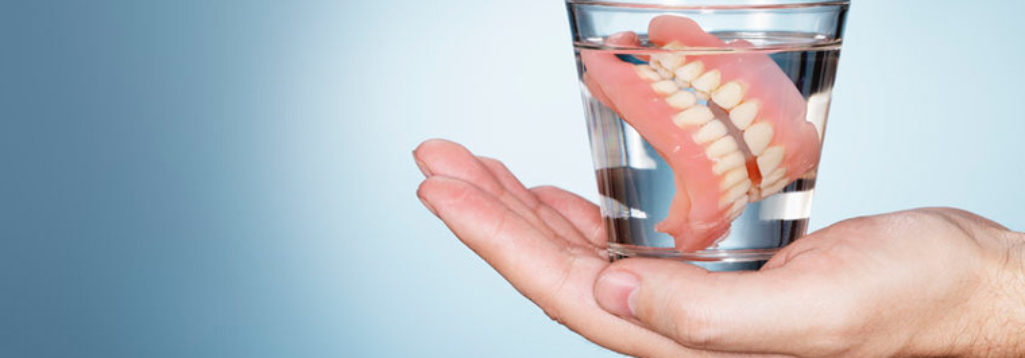
|

|

|

|

A patient’s guide to wearing Dentures
It is falsely believed that only senior citizens wear dentures. But it is not true. Anybody can need to wear a denture regardless of age. Players who are into vigorous games like may need it, similarly people involved in accidents and people with genetic disorders may require dentures.
What are dentures?
To put it simply, dentures are basically artificial teeth, used to replace original teeth. They are a removable appliance which replaces the lost teeth thereby giving you a beautiful smile. Dentures is an option when the teeth loss is not preventable because of infected gums and loss of tissues that connect the teeth to the jawbone. Dentures look almost like natural teeth but unfortunately they cannot work like natural teeth. That is why the dentist will always try to retain your natural tooth as far as possible. But if for whatever reasons many of your teeth are lost, than a denture becomes a necessity.
Dentures give you a natural look and fills up the gaps that had been created by lost teeth. The face and mouth look better and you get a bright confidant smile. But the fact remains, that dentures do not function as well as your natural teeth. It will allow you to eat normal food, but it is not possible to eat sticky or hard food with dentures.
The artificial teeth in dentures are fixed on an acrylic plate, which sits on the base of alveolar bone. This bone is a ridge left after all the teeth have been lost and only this bone remains. Because of the plate, the prosthesis becomes bulky and requires getting used to a foreign material in the mouth.
The technological advance in cosmetic dentistry has made it possible to have dentures fixed on the dental implants. Dental implants are titanium screws fitted in the jaw which work as an artificial tooth root. It is a base on which porcelain or resin composite teeth are fitted. The same implant can become a base on which dentures too can be fixed. When the dentures are fixed on dental implants, it makes dentures more firmly based and helps looking better because of less bulk and more functionality since dental implants on which dentures are fixed are firmly attached to the jawbone. This makes the dentures immovable and allows them to chew naturally on hard foods also.
In a way dental implants and dentures can be complementary technologies.
Different kinds of dentures
There are three kinds of dentures.
The conventional dentures is made after all teeth have been removed and the tissues have healed completely.
Many times the dentures are put in on the same day when teeth have been removed. These are Immediate dentures. Here you will have to reline your dentures after the mouth has healed.
In some cases some of your original teeth have to be preserved to save your jawbone. In such cases Your dentist will then make overdentures which will fit onto the remaining teeth.
Initially dentures may feel awkward in your mouth. Because of its bulk you may feel like throwing out the bulk from your mouth. Patience is important at this time. Be patient and within 2 to 3 weeks you will get used to it. The dentures may feel loose in the mouth till such time when the tongue and cheek muscle are used to it and learn to keep it in place. There will be soreness and irritation in the beginning is experienced for a few days in the beginning but will go away after meeting your dentist and getting corrections done a few times.
While eating too, you may get disappointed because dentures will not work as well as natural teeth. Begin with soft food. Take small bites and do not cut with front teeth as it may dislodge the dentures making the gums sore. Avoid biting but if you must, do it with canine teeth.
Initially you will it difficult to talk properly and legible. Read newspaper aloud. It will give you practice to talk with dentures.
If any problem arises, see your dentist and in case it is not possible to the dentist soon, then remove your dentures and keep them in solution till you can see your dentist because suffering too much pain and sore will result in trauma which will make it more difficult to adjust with your dentures.
The tissues in mouth keep moving and changing. It is advisable to see your dentist from time to time so that he can decide if there is a need to re align your dentures.
How to take care of dentures
If you look after your dentures as you do for your natural teeth, your dentures will last for a long time. Cleanliness for dentures are a must regardless of what kind or what material it is made of.
Good oral hygiene is as important as when you have natural teeth. Even when dentures have artificial teeth, plaque bacteria and tartar can ruin the gums and remaining teeth, if proper care is not taken to keep them clean.
To begin with you must take out your dentures and wash them under running water to clean them. Wash them with denture cleaner with a soft brush. Do not use toothpaste or any regular soap other that what has been prescribed by the dentist. Denture material is very delicate and any abrasive paste or soap may damage it.
It is important to brush with a soft bristled brush, your gums and upper palate, tongue and cheeks. A clean mouth will help in a long run.
Like the natural teeth, the dentures should be brushed everyday to remove food particles. Brushing will stop them from staining.
Dentures should be kept in water solution if not in use, to keep them from drying out.
It is important to see that it does not fall since they are made of delicate material.
Remove dentures before going to sleep. This will prevent them from slipping out and get damaged, and it will give some rest to your gums from the pressure of them.






